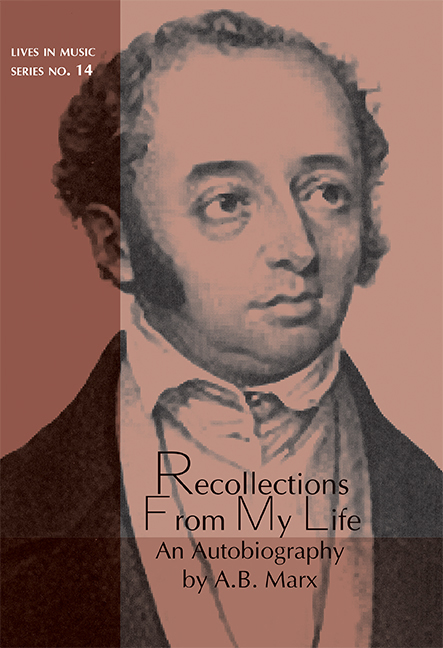Book contents
- Frontmatter
- Contents
- Introduction
- Select Bibliography
- Contents of Volume One
- 1 My Father's House
- 2 Musical Beginnings
- 3 War
- 4 Starting with Composition and Theory
- 5 The Theater in Weimar
- 6 War, again
- 7 The University
- 8 Early incentives for the practice of law
- 9 Legal practitioners
- 10 From Halle to Naumburg
- 11 To Berlin
- 12 Berlin
- 13 Fata Morgana
- 14 Personal relationships
- 15 The Berlin Opera at its height
- 16 Spontini
- Contents of Volume Two
- Afterword in place of foreword
- Translator's Note on Indexing
5 - The Theater in Weimar
from Contents of Volume One
- Frontmatter
- Contents
- Introduction
- Select Bibliography
- Contents of Volume One
- 1 My Father's House
- 2 Musical Beginnings
- 3 War
- 4 Starting with Composition and Theory
- 5 The Theater in Weimar
- 6 War, again
- 7 The University
- 8 Early incentives for the practice of law
- 9 Legal practitioners
- 10 From Halle to Naumburg
- 11 To Berlin
- 12 Berlin
- 13 Fata Morgana
- 14 Personal relationships
- 15 The Berlin Opera at its height
- 16 Spontini
- Contents of Volume Two
- Afterword in place of foreword
- Translator's Note on Indexing
Summary
What, moreover, during this entire time, taking in the last semester of school and the first year of university, came to my assistance, stimulating and enriching me, was the appearance of the Court Players from Weimar, which visited my hometown for several summers to give a series of performances. This was the first time that we were able to be present at truly artistic performances, and heard many operas by Paer, Winter, and especially by Mozart. The effect on us young people, entirely unaccustomed to life in a metropolis, was magical. When in Paer's Kamillathe husband, tormented by jealousy and thirst for revenge — this was the noble form of Strohmeier, then the leading basso — first appeared on the silent stage, wrote a letter to the outcast and imprisoned wife, took out her portrait, pressed it to his lips, and then smashed it to the ground, and once more moved away angrily: then we all could scarcely breathe, and only felt relieved, when he once more entered the theater, in order to now pour forth his lament in a milder, but more powerful voice. But when finally the moment of liberation approached, one looked to see in which of the underground vaults the unhappy and innocent woman sighed in anticipation of her death by starvation, and the chorus of the household on the stage called to the upper stories, in wide-resounding chords her name, Kamilla! — for a long time, unanswered, and finally guided by a weak sound in the right direction — then you could probably read on our pale faces the same anxiety, that threatened to suffocate everyone there on the stage.
It is the misfortune of large cities that everything is present in excess from the earliest childhood, so that everything is taken in prematurely and indifferently as well, and the powerful appeal of the new and unheard is lost, when the real years of enjoyment and elevation arrive. And it is the unacknowledged benefit of small and middling cities, that the rareness of artistic celebrations means longing desire and undefiled receptivity; — provided there is spiritual inclination on the part of the residents.
- Type
- Chapter
- Information
- Recollections From My LifeAn Autobiography by A. B. Marx, pp. 28 - 31Publisher: Boydell & BrewerPrint publication year: 2017



